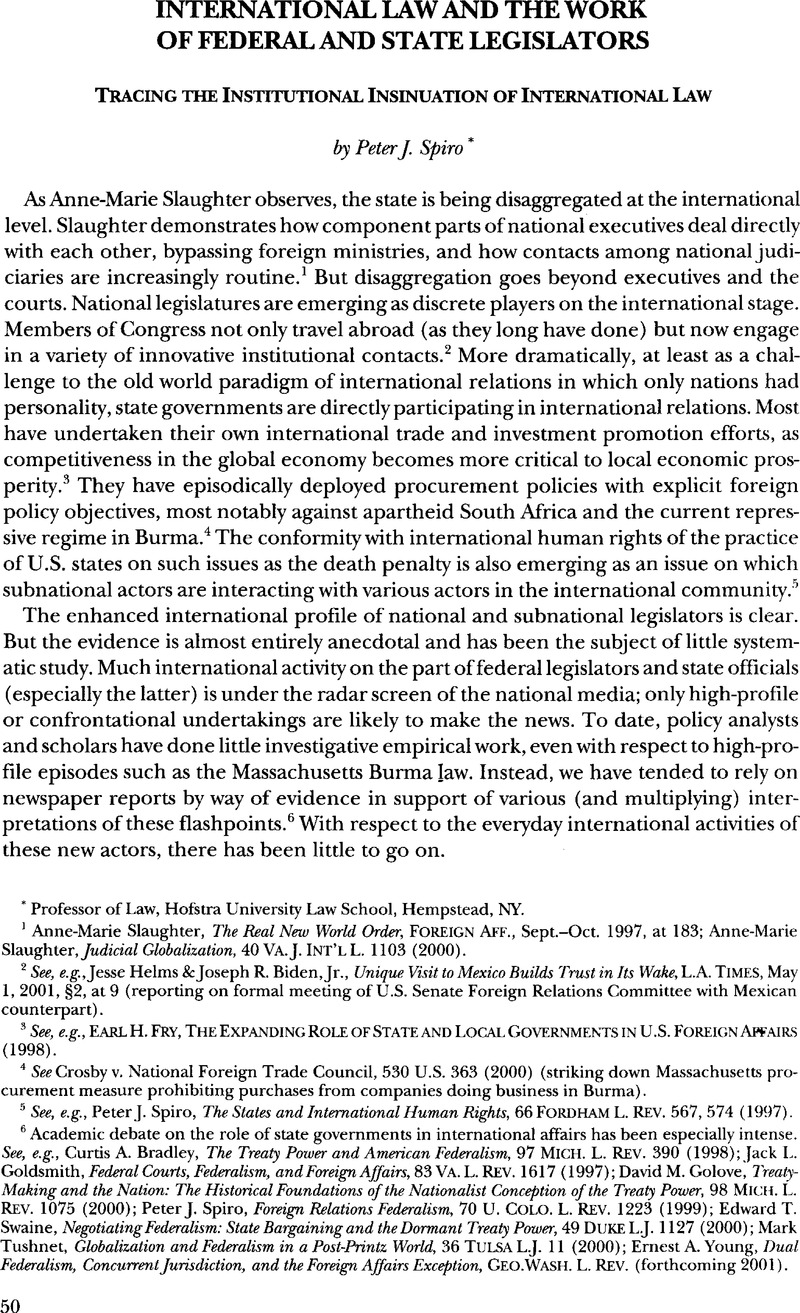No CrossRef data available.
Article contents
Tracing the Institutional Insinuation of International Law
Published online by Cambridge University Press: 28 February 2017
Abstract

- Type
- International Law and the Work of Federal and State Legislators
- Information
- Copyright
- Copyright © American Society of International Law 2001
References
1 Slaughter, Anne-Marie, The Real New World Order, Foreign Aff., Sept.-Oct. 1997, at 183 CrossRefGoogle Scholar; Slaughter, Anne-Marie, Judicial Globalization, 40 Va. J. Int’l L. 1103 (2000)Google Scholar.
2 See, e.g., Jesse Helms & Joseph R. Biden,Jr., Unique Visit to Mexico Builds Trust in Its Wake, L.A. Times, May 1, 2001, §2, at 9 (reporting on formal meeting of U.S. Senate Foreign Relations Committee with Mexican counterpart).
3 See, e.g., Earl H. Fry, The Expanding Role of State and Local Governments in U.S. Foreign Affairs (1998).
4 See Crosby v. National Foreign Trade Council, 530 U.S. 363 (2000) (striking down Massachusetts procurement measure prohibiting purchases from companies doing business in Burma).
5 See, e.g., Spiro, Peter J., The States and International Human Rights, 66 Fordham L. Rev. 567, 574 (1997)Google Scholar.
6 Academic debate on the role of state governments in international affairs has been especially intense. See, e.g., Curtis A.\Bradley, , The Treaty Power and American Federalism, 97 Mich. L. Rev. 390 (1998)Google Scholar; Goldsmith, Jack L., Federal Courts, Federalism, and Foreign Affairs, 83 Va. L. Rev. 1617 (1997)CrossRefGoogle Scholar; Golove, David M., Treaty-Making and the Nation: The Historical Foundations of the Nationalist Conception of the Treaty Power, 98 Mich. L. Rev. 1075 (2000)CrossRefGoogle Scholar; Spiro, Peter J., Foreign Relations Federalism, 70 U. Colo. L. Rev. 1223 (1999)Google Scholar; Swaine, Edward T., Negotiating Federalism: State Bargaining and the Dormant Treaty Power, 49 Duke L J. 1127 (2000)CrossRefGoogle Scholar; Tushnet, Mark, Globalization and Federalism in a Post-Printz World, 36 Tulsa L J. 11 (2000)Google Scholar; Young, Ernest A., Dual Federalism, Concurrent Jurisdiction, and the Foreign Affairs Exception, Geo. Wash. L. Rev. (forthcoming 2001)Google Scholar.
7 Vienna Convention on Consular Relations, Apr. 24, 1963, 21 UST 77, 596 UNTS 261. For a discussion of the most notable episode involving a violation of the convention by state law enforcement authorities, see Agora: Breard, 92 AJIL 666 (1998).




